The Fifth French Republic Fifth Republic 1958 –

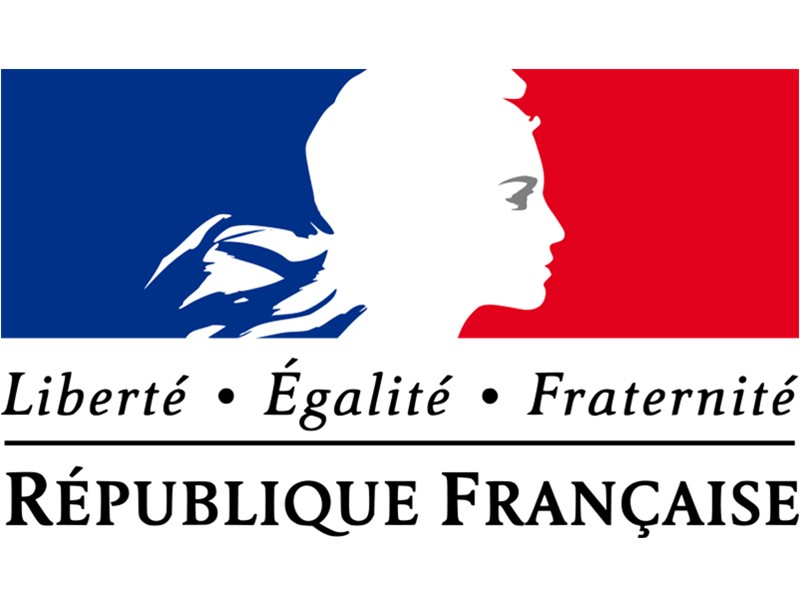
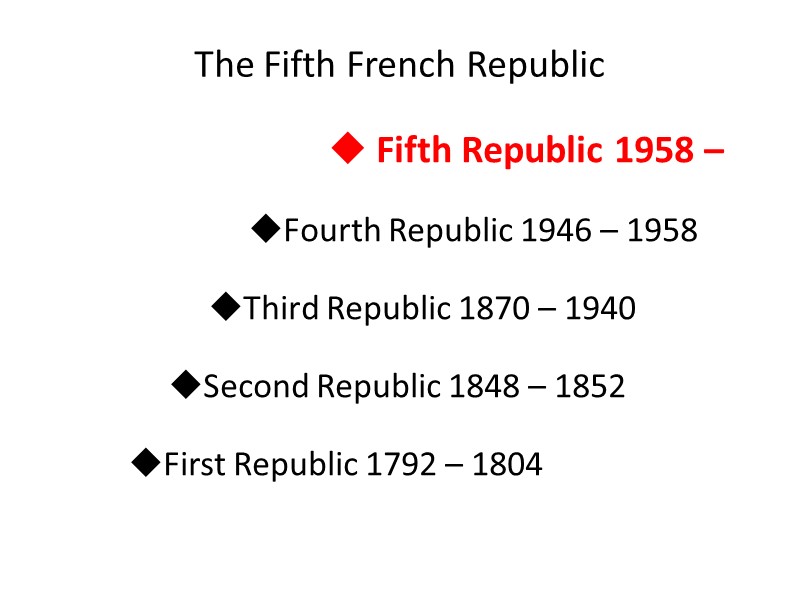
The Fifth French Republic Fifth Republic 1958 – Fourth Republic 1946 – 1958 Third Republic 1870 – 1940 Second Republic 1848 – 1852 First Republic 1792 – 1804
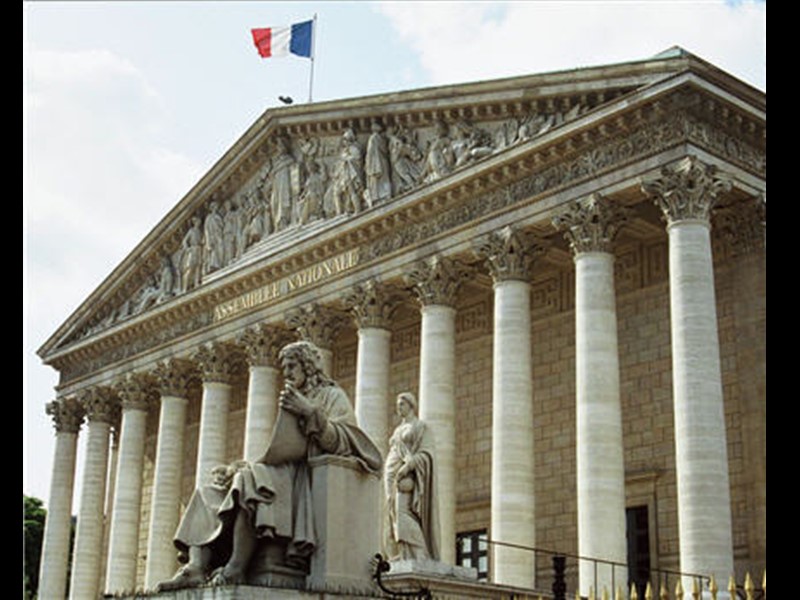
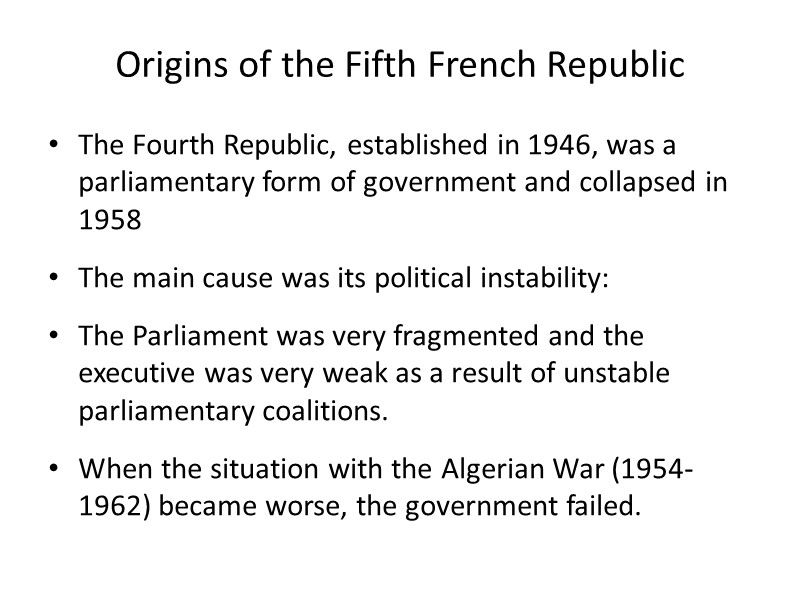
Origins of the Fifth French Republic The Fourth Republic, established in 1946, was a parliamentary form of government and collapsed in 1958 The main cause was its political instability: The Parliament was very fragmented and the executive was very weak as a result of unstable parliamentary coalitions. When the situation with the Algerian War (1954-1962) became worse, the government failed.
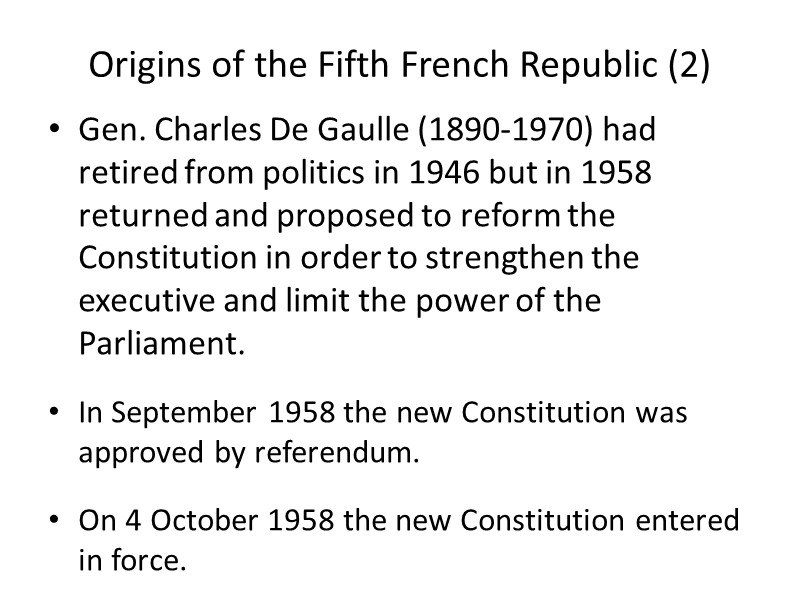
Origins of the Fifth French Republic (2) Gen. Charles De Gaulle (1890-1970) had retired from politics in 1946 but in 1958 returned and proposed to reform the Constitution in order to strengthen the executive and limit the power of the Parliament. In September 1958 the new Constitution was approved by referendum. On 4 October 1958 the new Constitution entered in force.
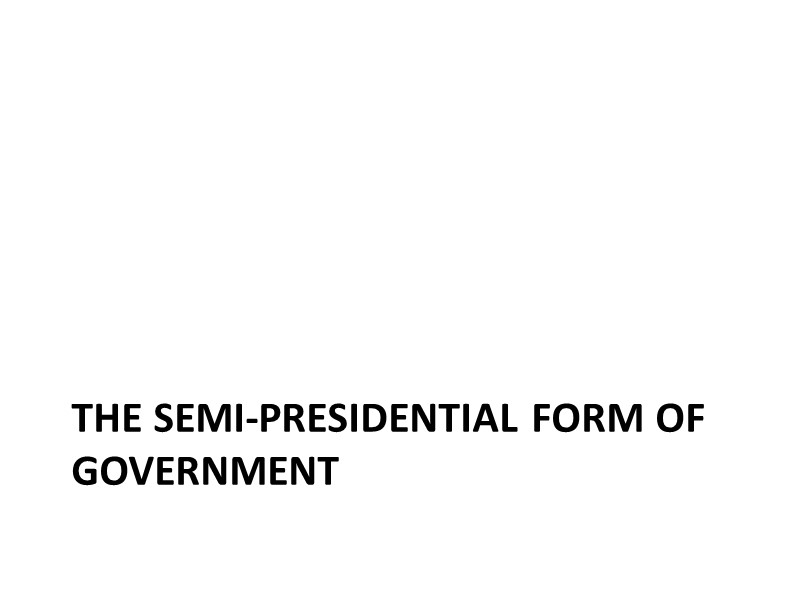
THE SEMI-PRESIDENTIAL FORM OF GOVERNMENT
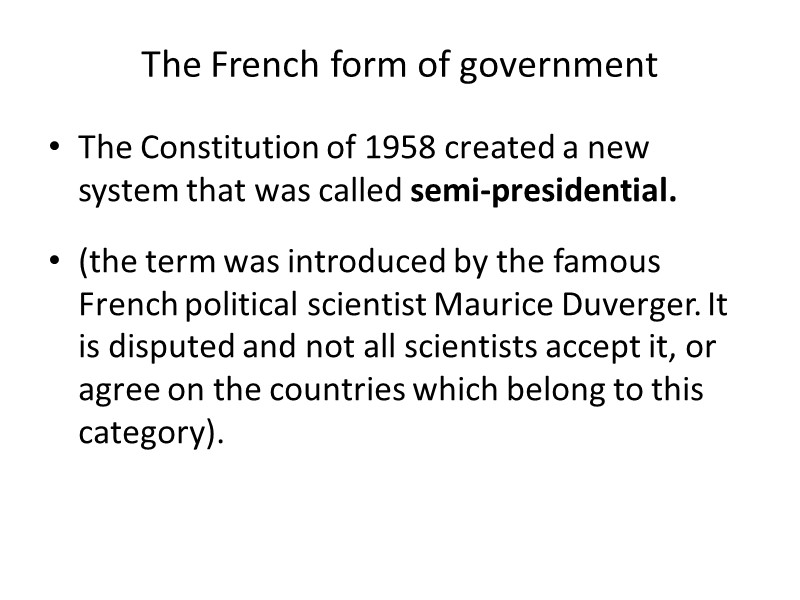
The French form of government The Constitution of 1958 created a new system that was called semi-presidential. (the term was introduced by the famous French political scientist Maurice Duverger. It is disputed and not all scientists accept it, or agree on the countries which belong to this category).
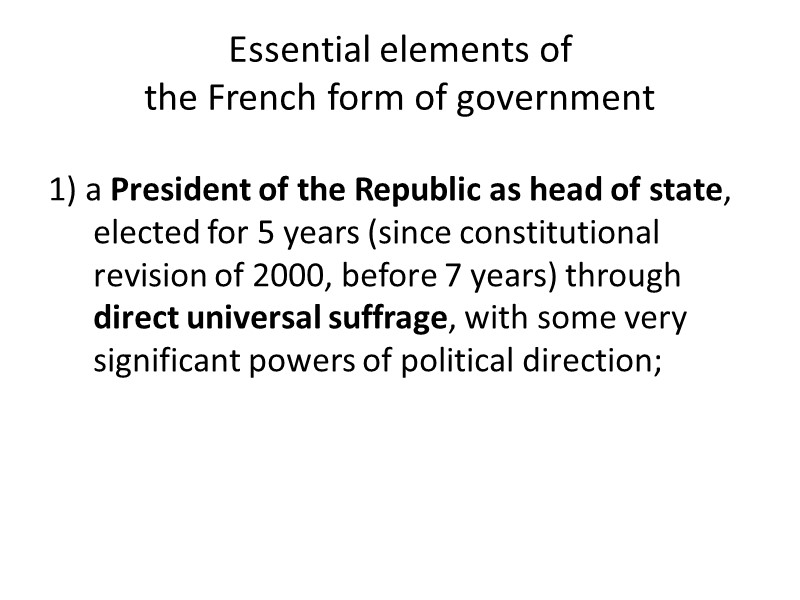
Essential elements of the French form of government 1) a President of the Republic as head of state, elected for 5 years (since constitutional revision of 2000, before 7 years) through direct universal suffrage, with some very significant powers of political direction;
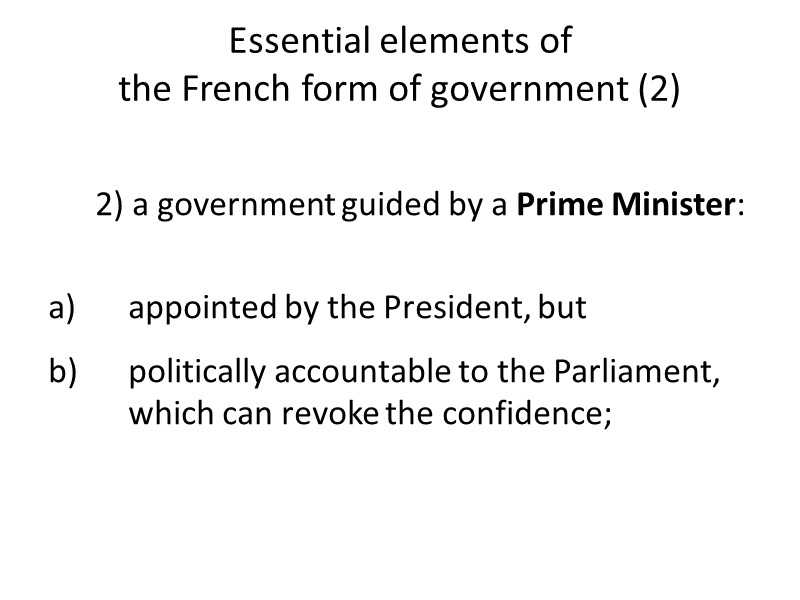
Essential elements of the French form of government (2) 2) a government guided by a Prime Minister: appointed by the President, but politically accountable to the Parliament, which can revoke the confidence;
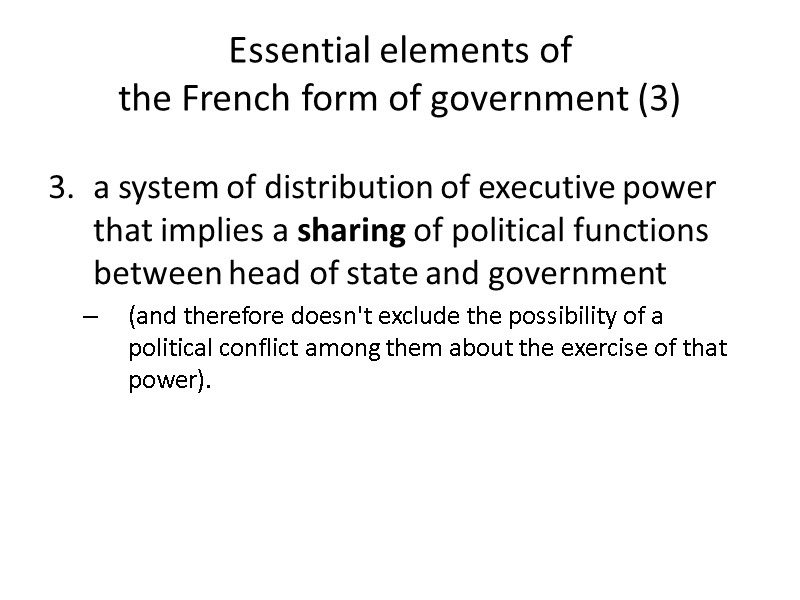
Essential elements of the French form of government (3) a system of distribution of executive power that implies a sharing of political functions between head of state and government (and therefore doesn't exclude the possibility of a political conflict among them about the exercise of that power).
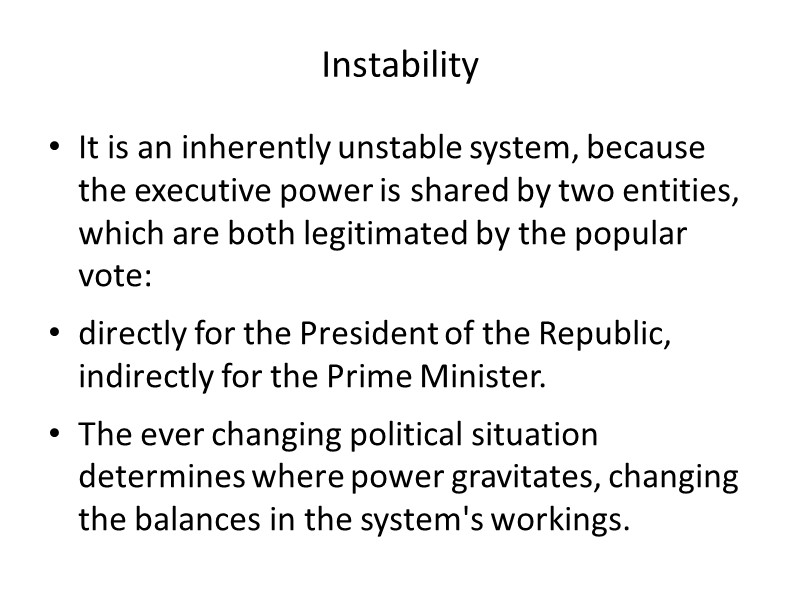
Instability It is an inherently unstable system, because the executive power is shared by two entities, which are both legitimated by the popular vote: directly for the President of the Republic, indirectly for the Prime Minister. The ever changing political situation determines where power gravitates, changing the balances in the system's workings.
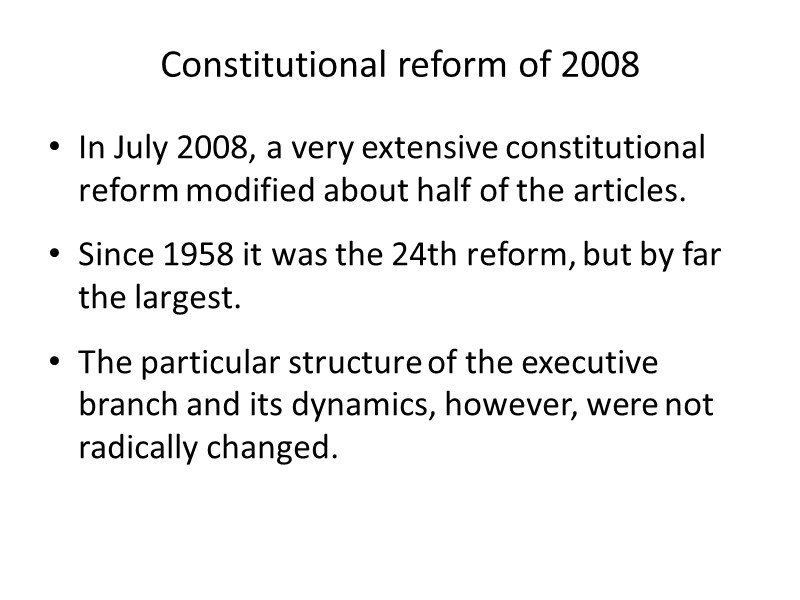
Constitutional reform of 2008 In July 2008, a very extensive constitutional reform modified about half of the articles. Since 1958 it was the 24th reform, but by far the largest. The particular structure of the executive branch and its dynamics, however, were not radically changed.
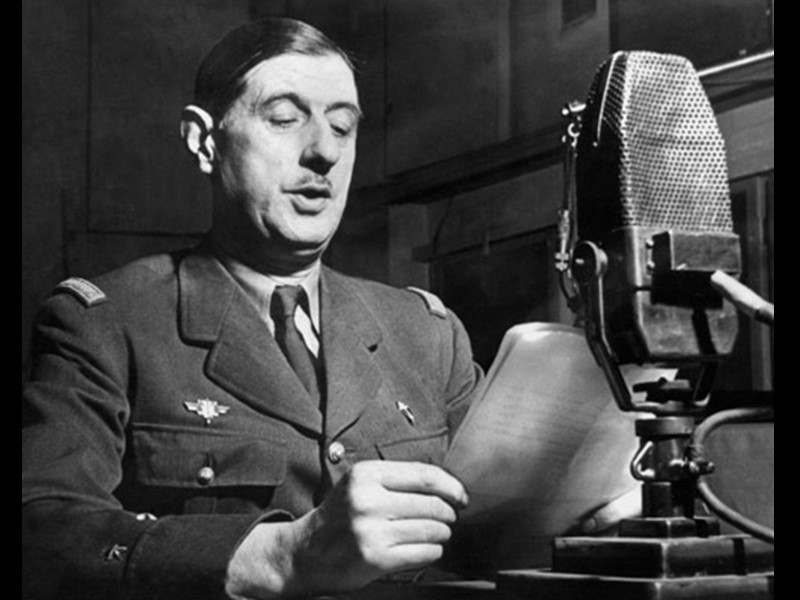
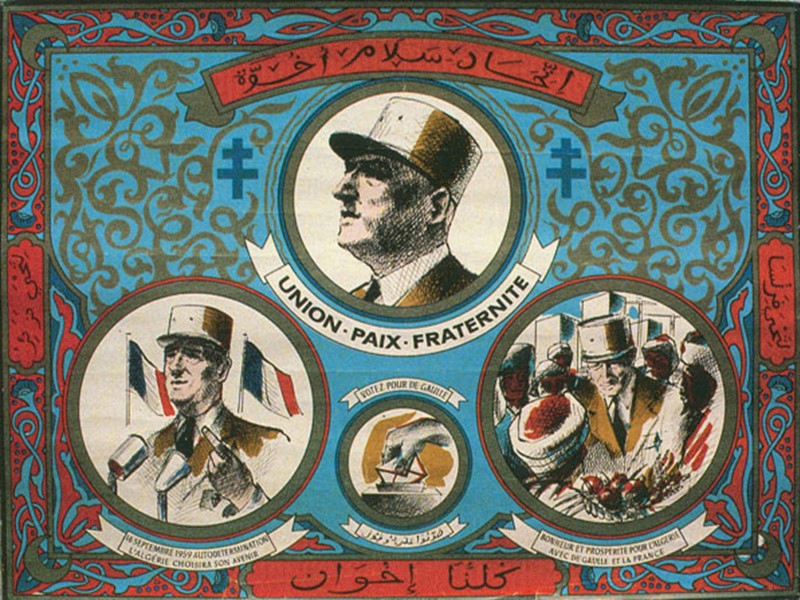
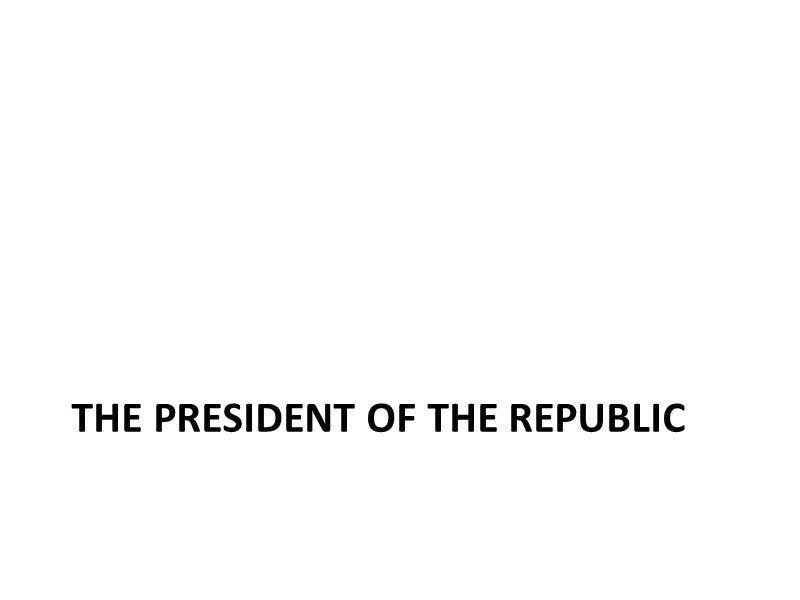
THE PRESIDENT OF THE REPUBLIC
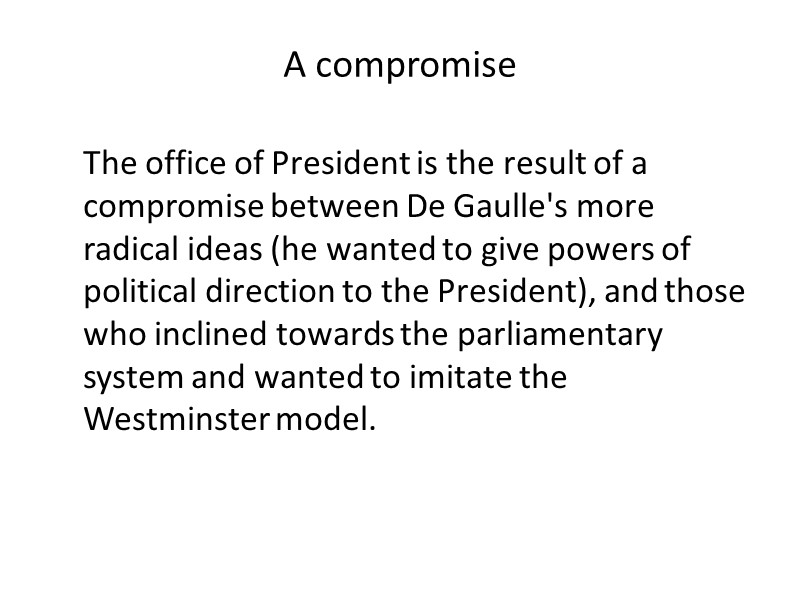
A compromise The office of President is the result of a compromise between De Gaulle's more radical ideas (he wanted to give powers of political direction to the President), and those who inclined towards the parliamentary system and wanted to imitate the Westminster model.
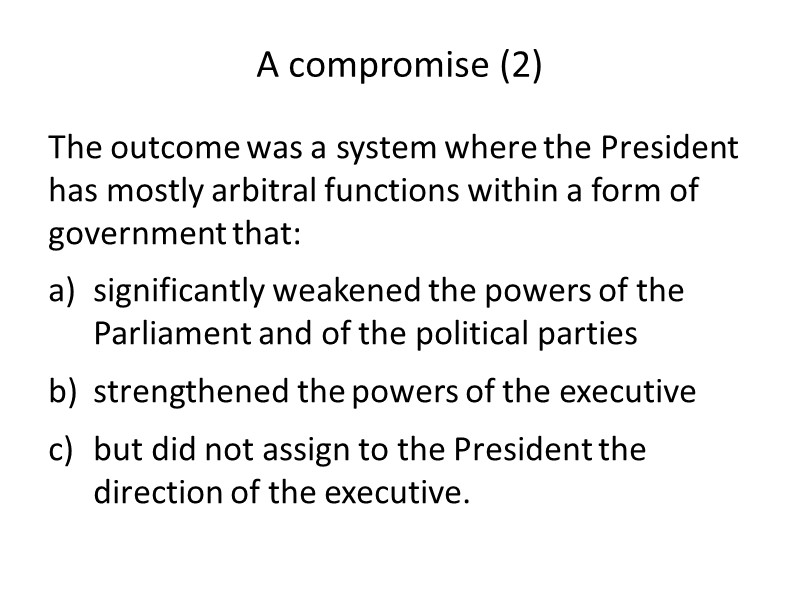
A compromise (2) The outcome was a system where the President has mostly arbitral functions within a form of government that: significantly weakened the powers of the Parliament and of the political parties strengthened the powers of the executive but did not assign to the President the direction of the executive.
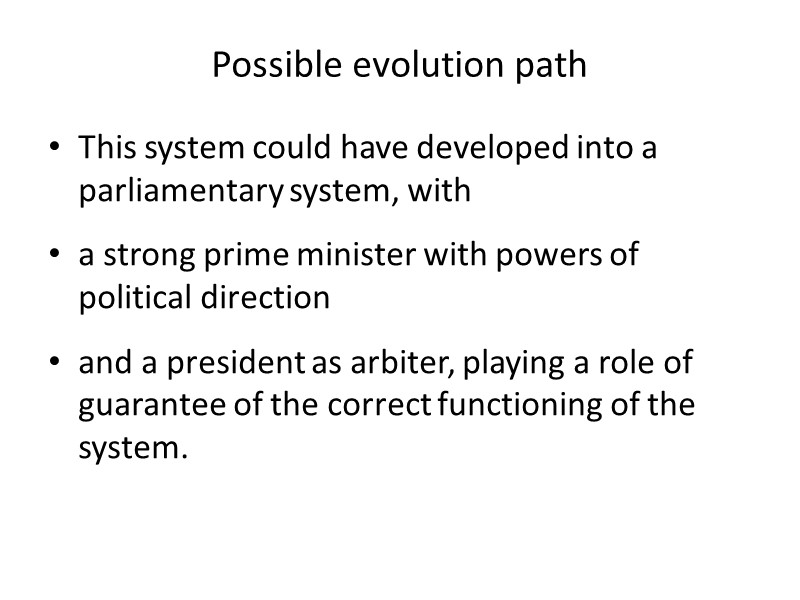
Possible evolution path This system could have developed into a parliamentary system, with a strong prime minister with powers of political direction and a president as arbiter, playing a role of guarantee of the correct functioning of the system.
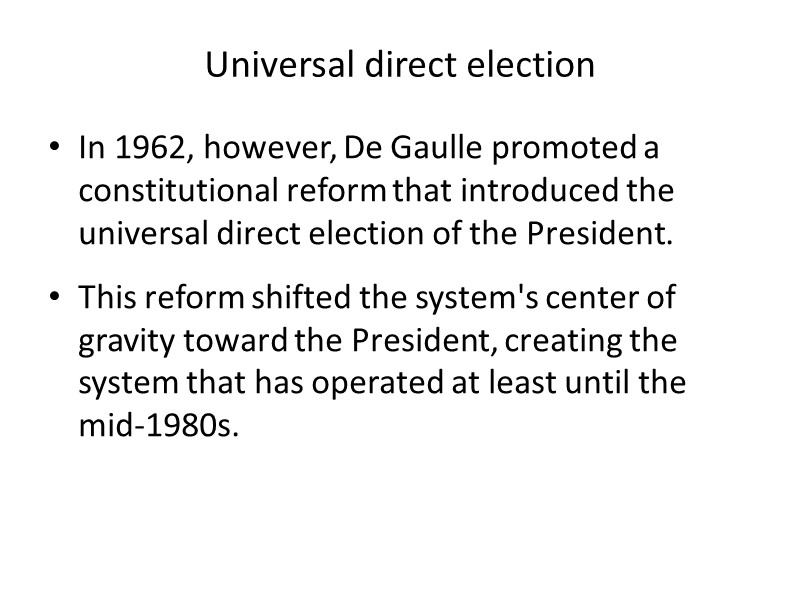
Universal direct election In 1962, however, De Gaulle promoted a constitutional reform that introduced the universal direct election of the President. This reform shifted the system's center of gravity toward the President, creating the system that has operated at least until the mid-1980s.
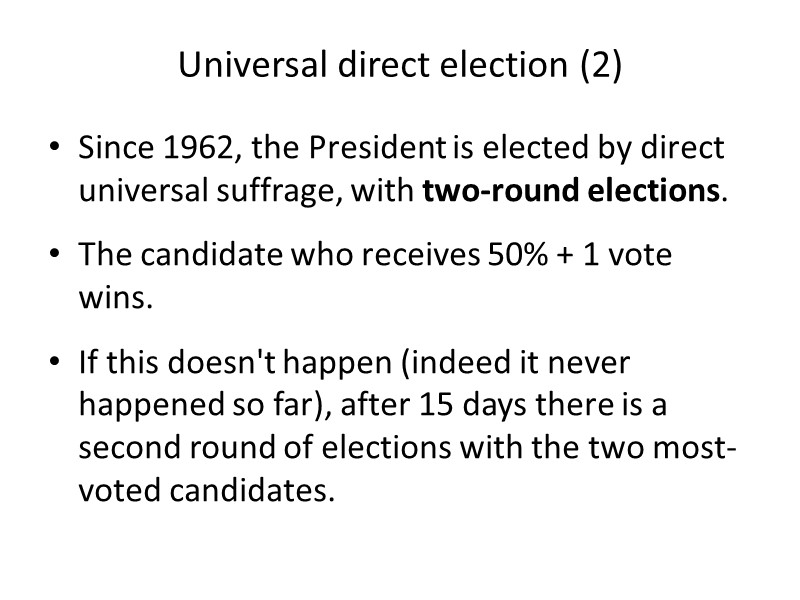
Universal direct election (2) Since 1962, the President is elected by direct universal suffrage, with two-round elections. The candidate who receives 50% + 1 vote wins. If this doesn't happen (indeed it never happened so far), after 15 days there is a second round of elections with the two most-voted candidates.
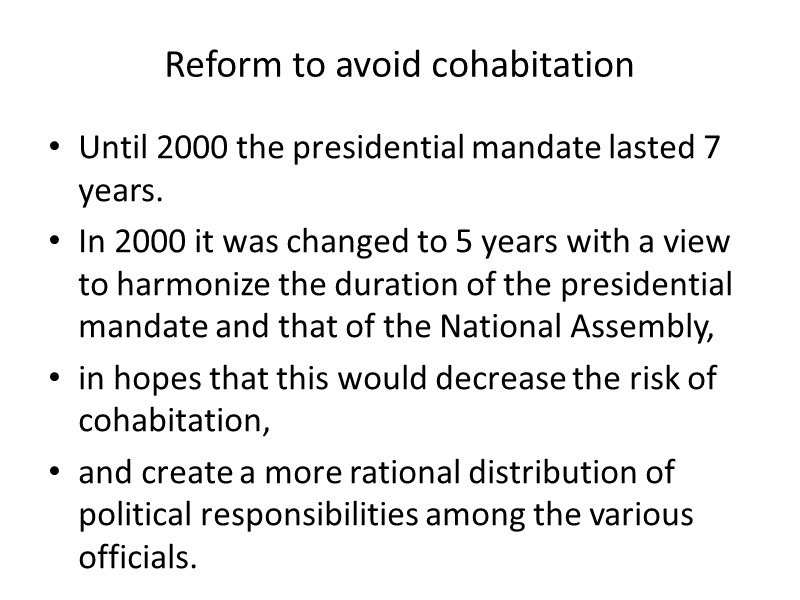
Reform to avoid cohabitation Until 2000 the presidential mandate lasted 7 years. In 2000 it was changed to 5 years with a view to harmonize the duration of the presidential mandate and that of the National Assembly, in hopes that this would decrease the risk of cohabitation, and create a more rational distribution of political responsibilities among the various officials.
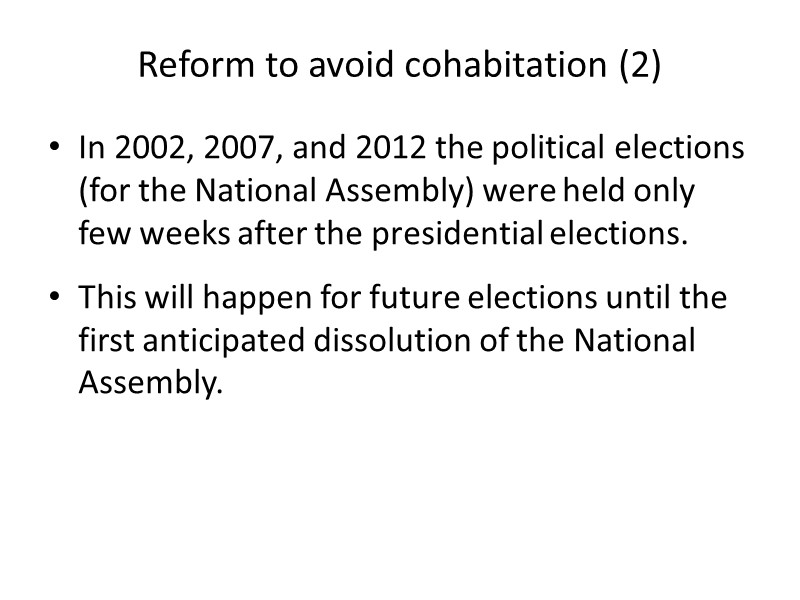
Reform to avoid cohabitation (2) In 2002, 2007, and 2012 the political elections (for the National Assembly) were held only few weeks after the presidential elections. This will happen for future elections until the first anticipated dissolution of the National Assembly.
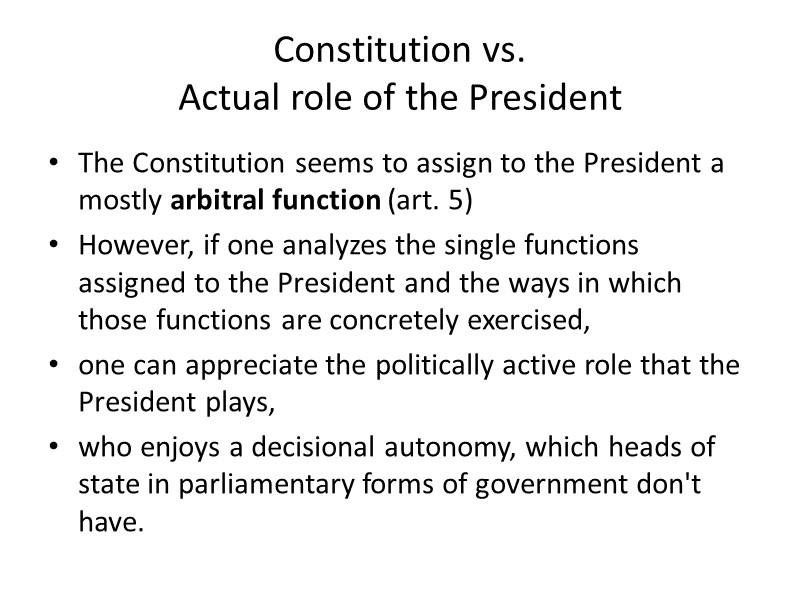
Constitution vs. Actual role of the President The Constitution seems to assign to the President a mostly arbitral function (art. 5) However, if one analyzes the single functions assigned to the President and the ways in which those functions are concretely exercised, one can appreciate the politically active role that the President plays, who enjoys a decisional autonomy, which heads of state in parliamentary forms of government don't have.
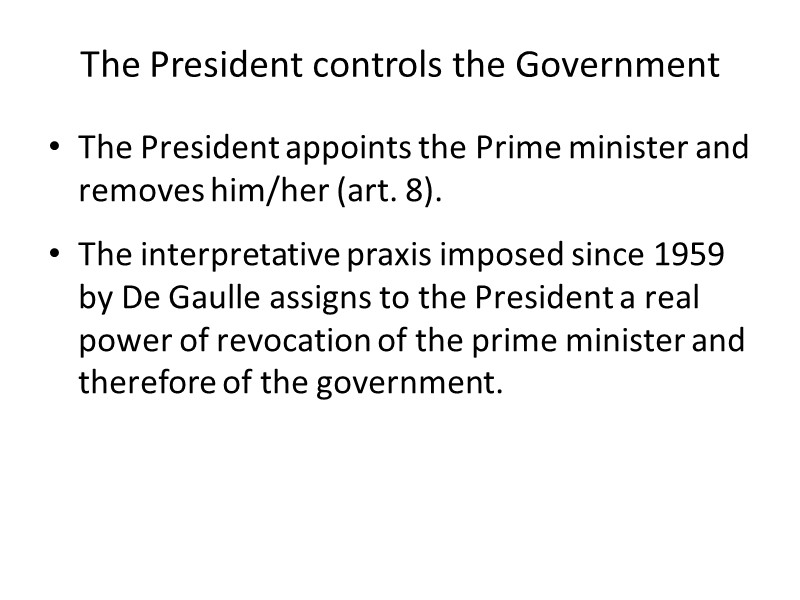
The President controls the Government The President appoints the Prime minister and removes him/her (art. 8). The interpretative praxis imposed since 1959 by De Gaulle assigns to the President a real power of revocation of the prime minister and therefore of the government.
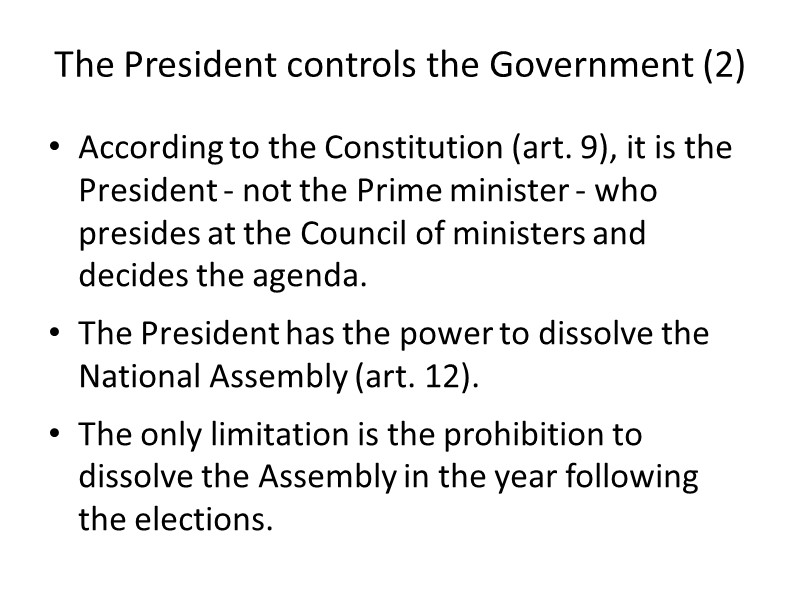
The President controls the Government (2) According to the Constitution (art. 9), it is the President - not the Prime minister - who presides at the Council of ministers and decides the agenda. The President has the power to dissolve the National Assembly (art. 12). The only limitation is the prohibition to dissolve the Assembly in the year following the elections.
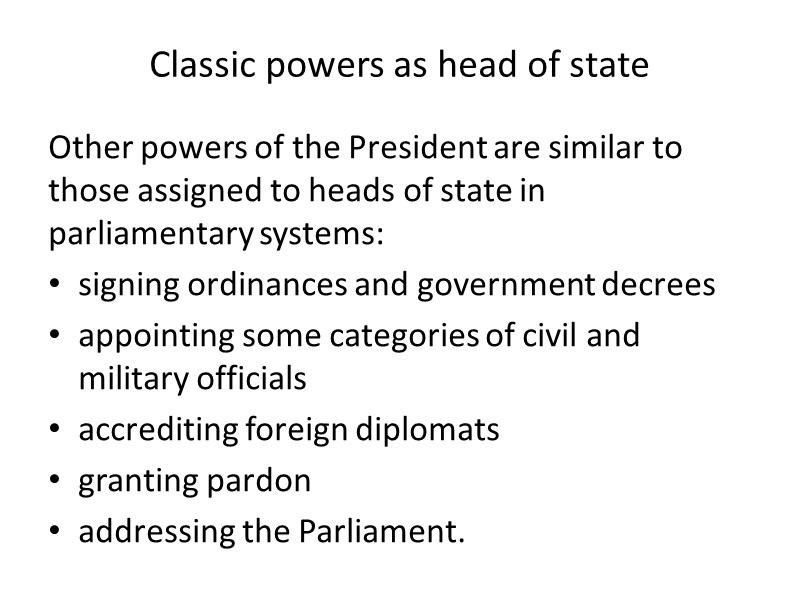
Classic powers as head of state Other powers of the President are similar to those assigned to heads of state in parliamentary systems: signing ordinances and government decrees appointing some categories of civil and military officials accrediting foreign diplomats granting pardon addressing the Parliament.
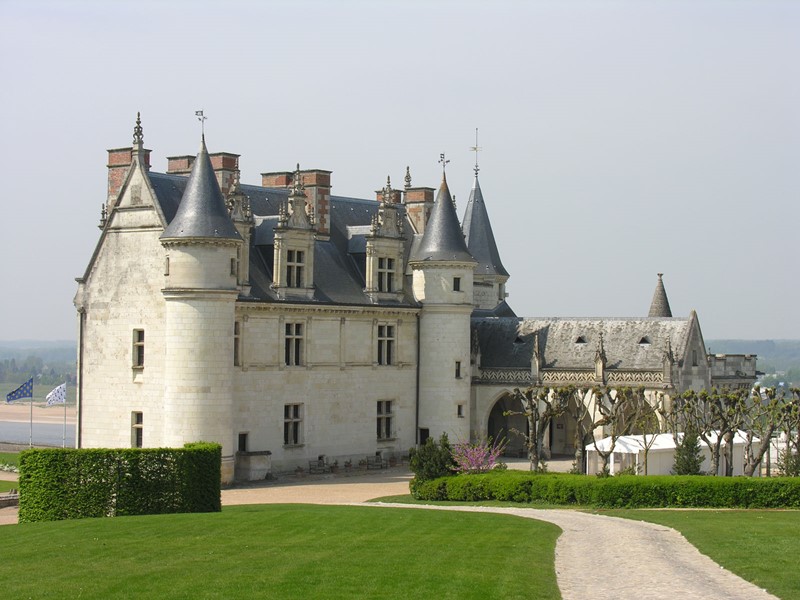
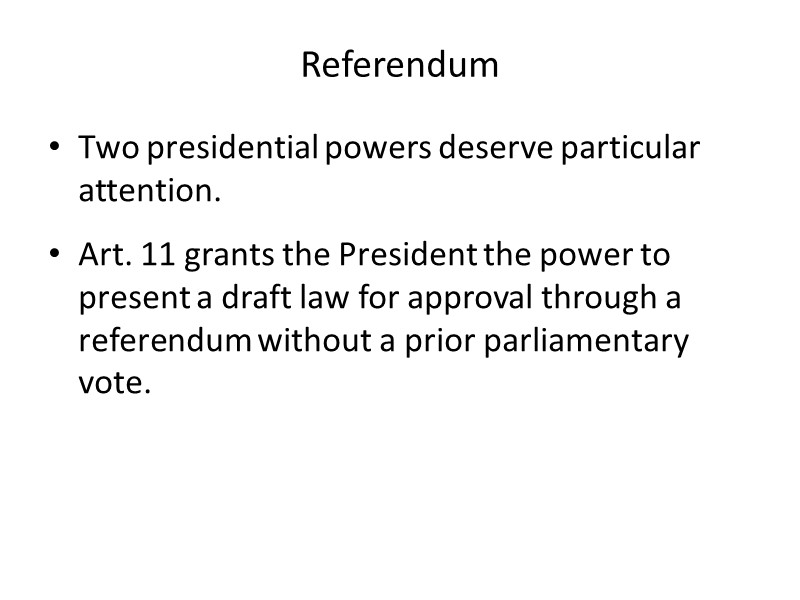
Referendum Two presidential powers deserve particular attention. Art. 11 grants the President the power to present a draft law for approval through a referendum without a prior parliamentary vote.
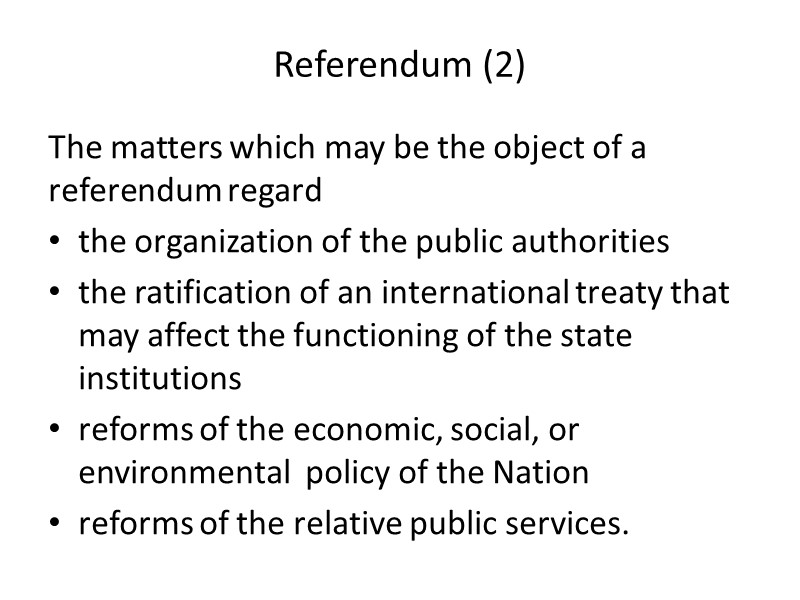
Referendum (2) The matters which may be the object of a referendum regard the organization of the public authorities the ratification of an international treaty that may affect the functioning of the state institutions reforms of the economic, social, or environmental policy of the Nation reforms of the relative public services.
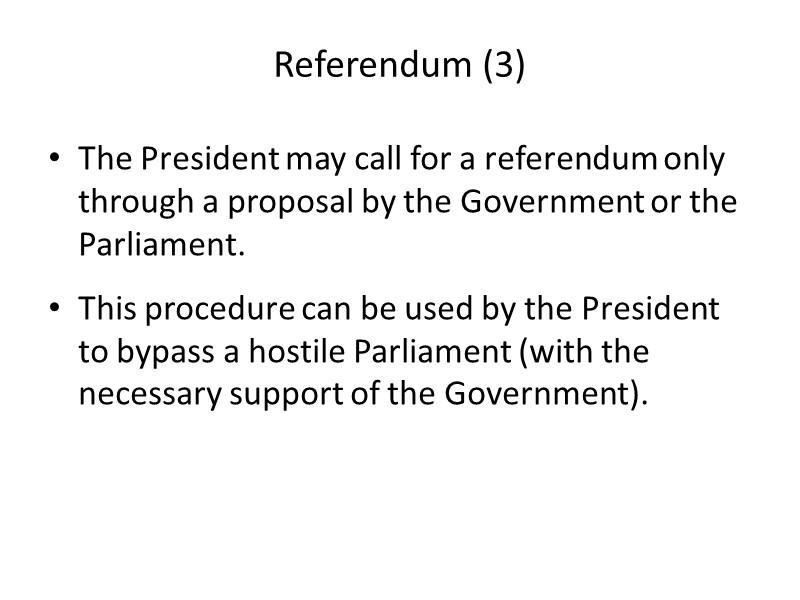
Referendum (3) The President may call for a referendum only through a proposal by the Government or the Parliament. This procedure can be used by the President to bypass a hostile Parliament (with the necessary support of the Government).
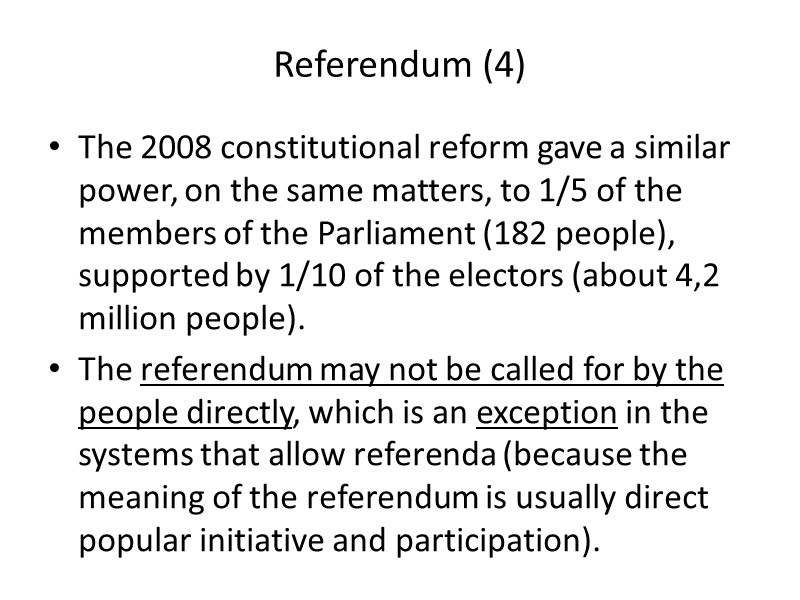
Referendum (4) The 2008 constitutional reform gave a similar power, on the same matters, to 1/5 of the members of the Parliament (182 people), supported by 1/10 of the electors (about 4,2 million people). The referendum may not be called for by the people directly, which is an exception in the systems that allow referenda (because the meaning of the referendum is usually direct popular initiative and participation).
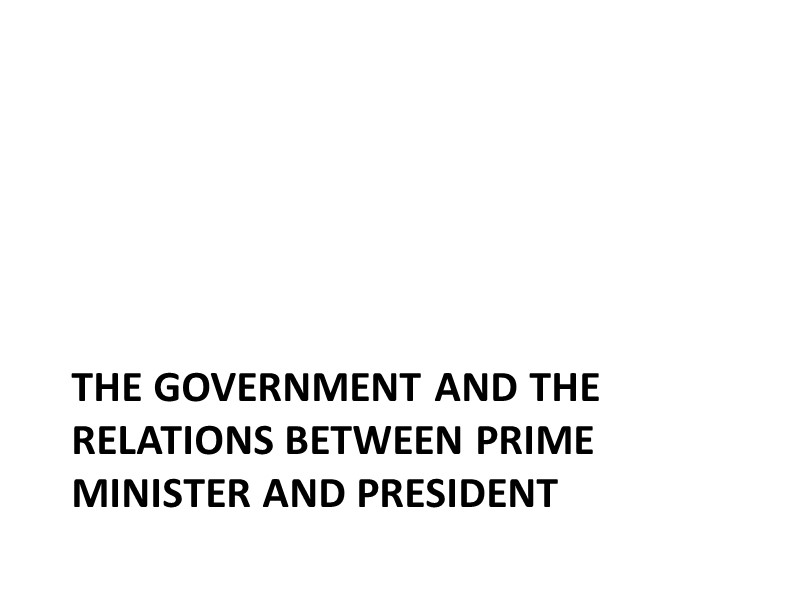
The Government and the relations between Prime minister and President
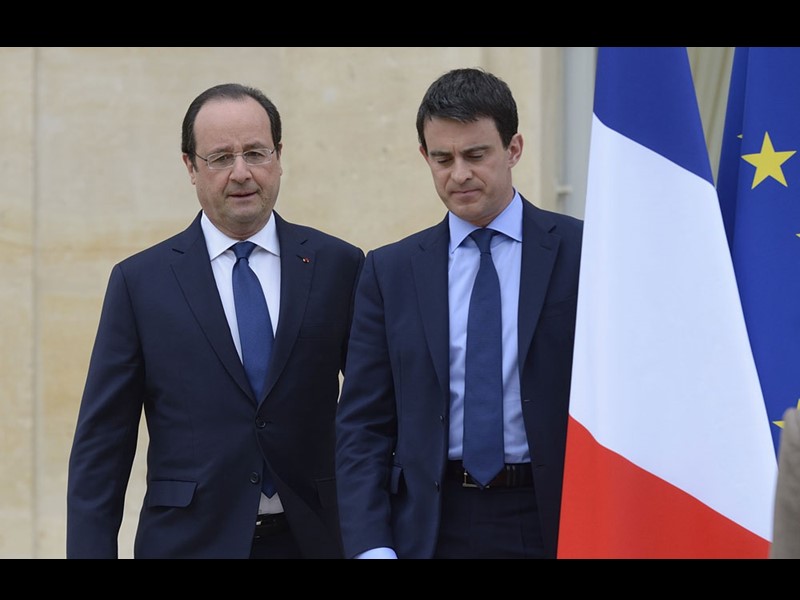
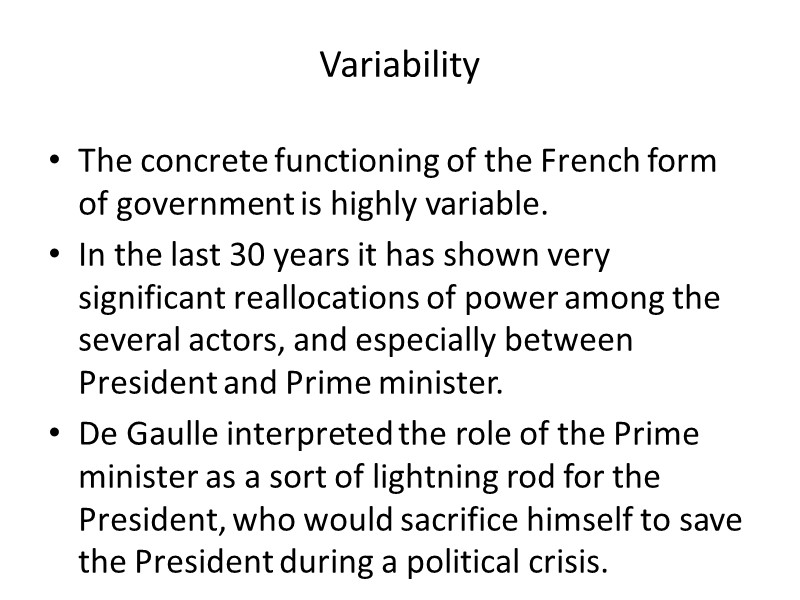
Variability The concrete functioning of the French form of government is highly variable. In the last 30 years it has shown very significant reallocations of power among the several actors, and especially between President and Prime minister. De Gaulle interpreted the role of the Prime minister as a sort of lightning rod for the President, who would sacrifice himself to save the President during a political crisis.
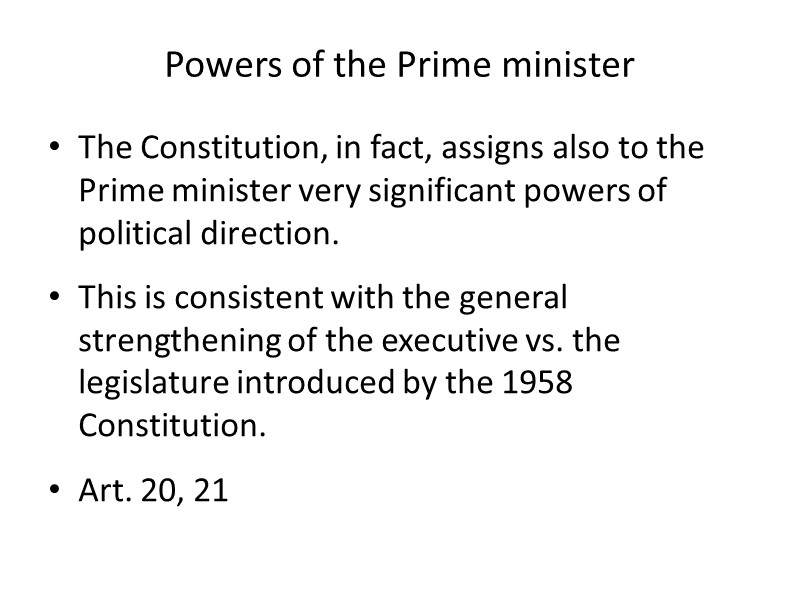
Powers of the Prime minister The Constitution, in fact, assigns also to the Prime minister very significant powers of political direction. This is consistent with the general strengthening of the executive vs. the legislature introduced by the 1958 Constitution. Art. 20, 21
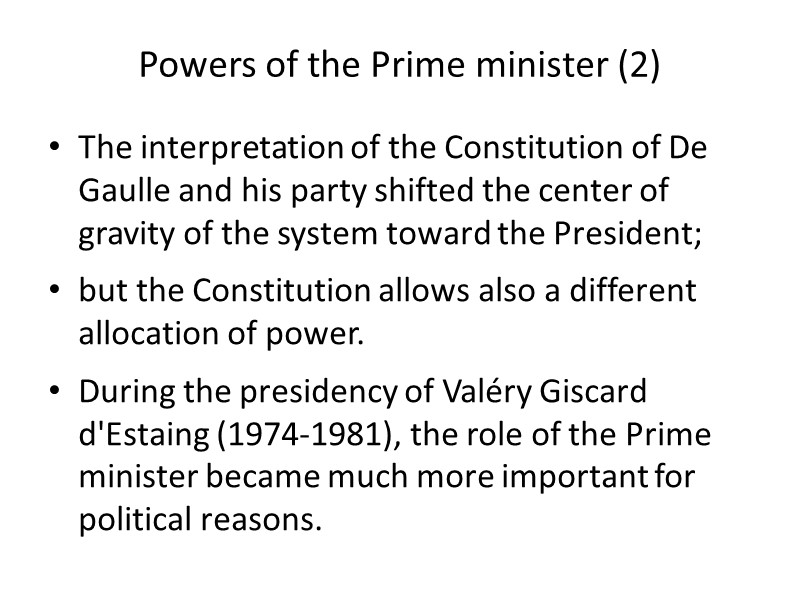
Powers of the Prime minister (2) The interpretation of the Constitution of De Gaulle and his party shifted the center of gravity of the system toward the President; but the Constitution allows also a different allocation of power. During the presidency of Valéry Giscard d'Estaing (1974-1981), the role of the Prime minister became much more important for political reasons.
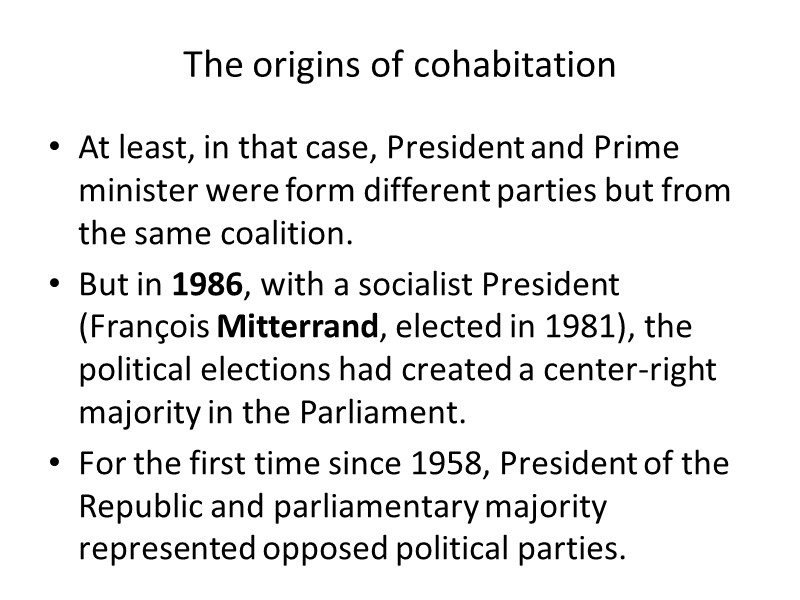
The origins of cohabitation At least, in that case, President and Prime minister were form different parties but from the same coalition. But in 1986, with a socialist President (François Mitterrand, elected in 1981), the political elections had created a center-right majority in the Parliament. For the first time since 1958, President of the Republic and parliamentary majority represented opposed political parties.
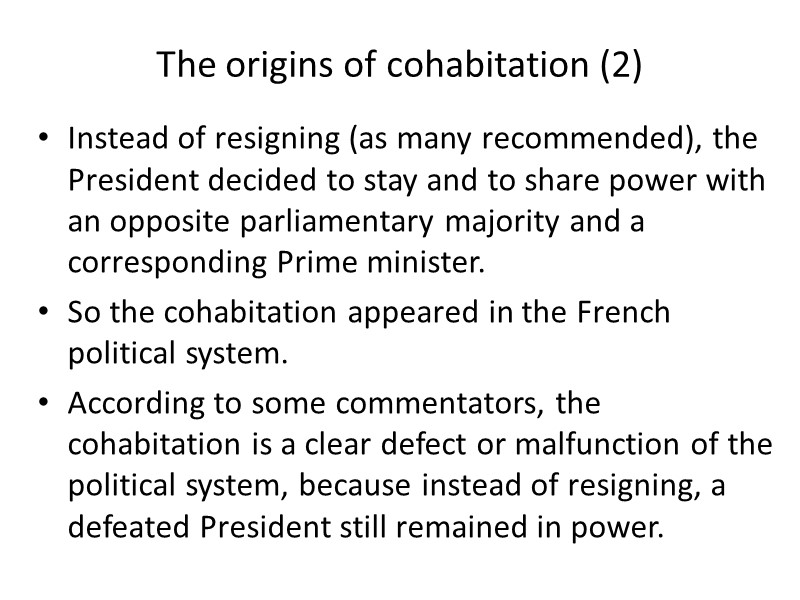
The origins of cohabitation (2) Instead of resigning (as many recommended), the President decided to stay and to share power with an opposite parliamentary majority and a corresponding Prime minister. So the cohabitation appeared in the French political system. According to some commentators, the cohabitation is a clear defect or malfunction of the political system, because instead of resigning, a defeated President still remained in power.
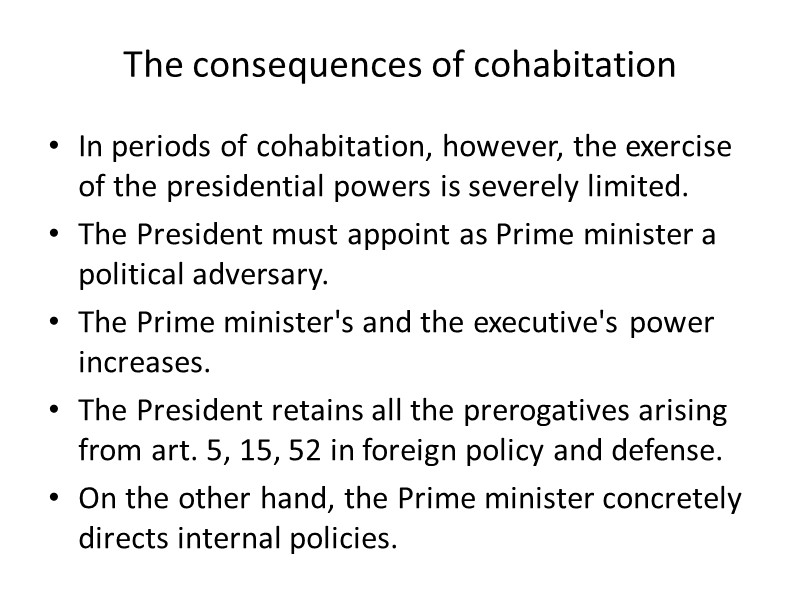
The consequences of cohabitation In periods of cohabitation, however, the exercise of the presidential powers is severely limited. The President must appoint as Prime minister a political adversary. The Prime minister's and the executive's power increases. The President retains all the prerogatives arising from art. 5, 15, 52 in foreign policy and defense. On the other hand, the Prime minister concretely directs internal policies.
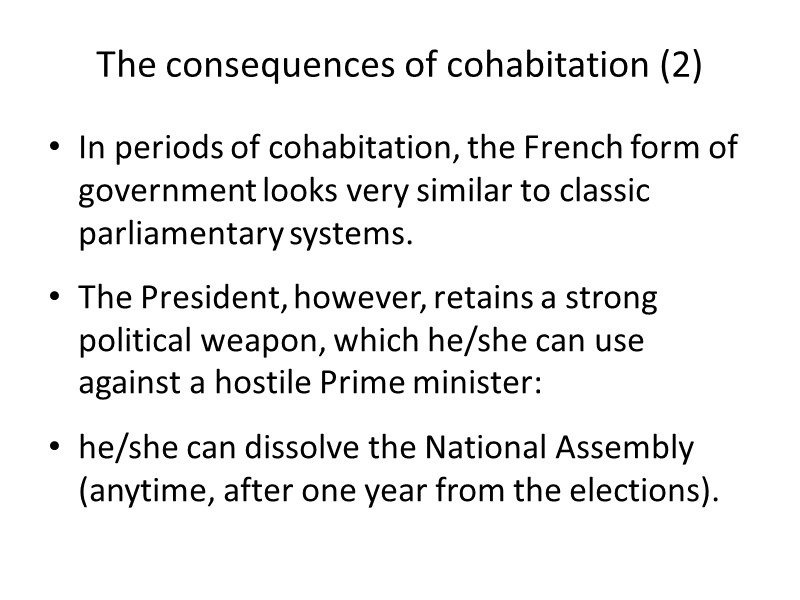
The consequences of cohabitation (2) In periods of cohabitation, the French form of government looks very similar to classic parliamentary systems. The President, however, retains a strong political weapon, which he/she can use against a hostile Prime minister: he/she can dissolve the National Assembly (anytime, after one year from the elections).
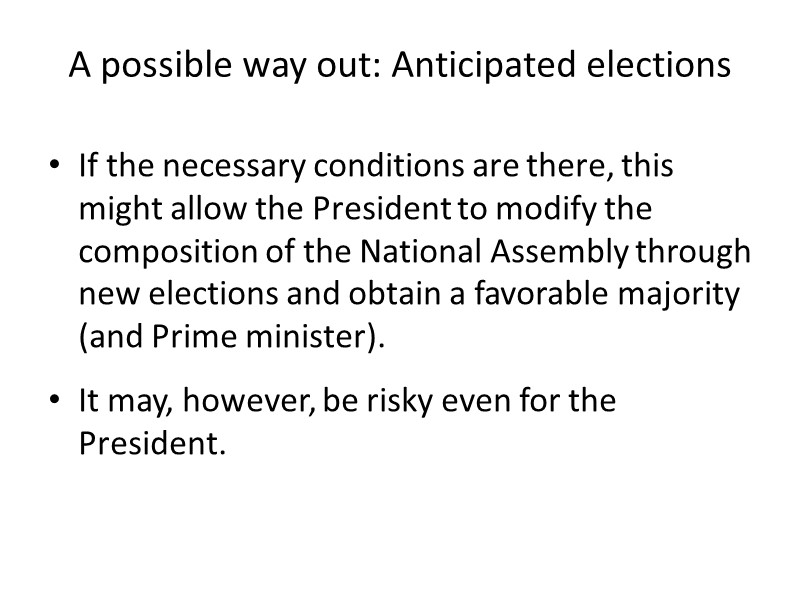
A possible way out: Anticipated elections If the necessary conditions are there, this might allow the President to modify the composition of the National Assembly through new elections and obtain a favorable majority (and Prime minister). It may, however, be risky even for the President.
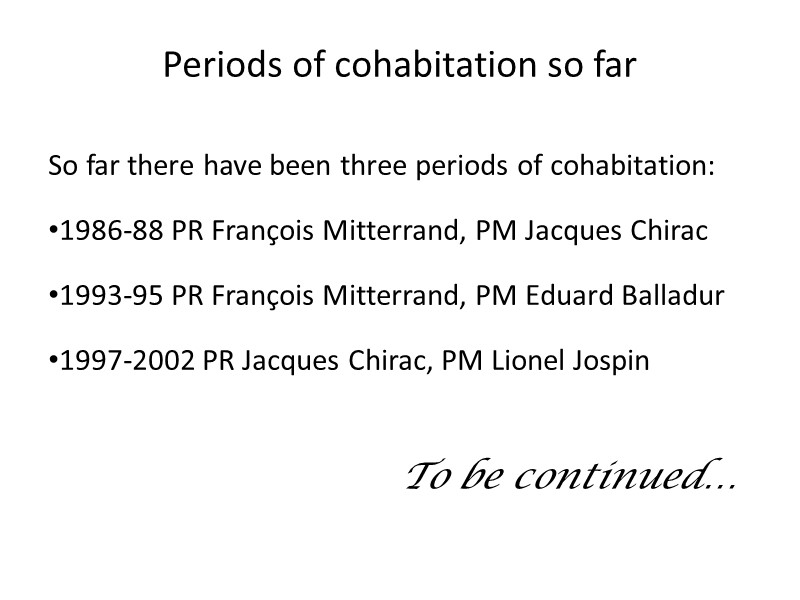
Periods of cohabitation so far So far there have been three periods of cohabitation: 1986-88 PR François Mitterrand, PM Jacques Chirac 1993-95 PR François Mitterrand, PM Eduard Balladur 1997-2002 PR Jacques Chirac, PM Lionel Jospin To be continued…
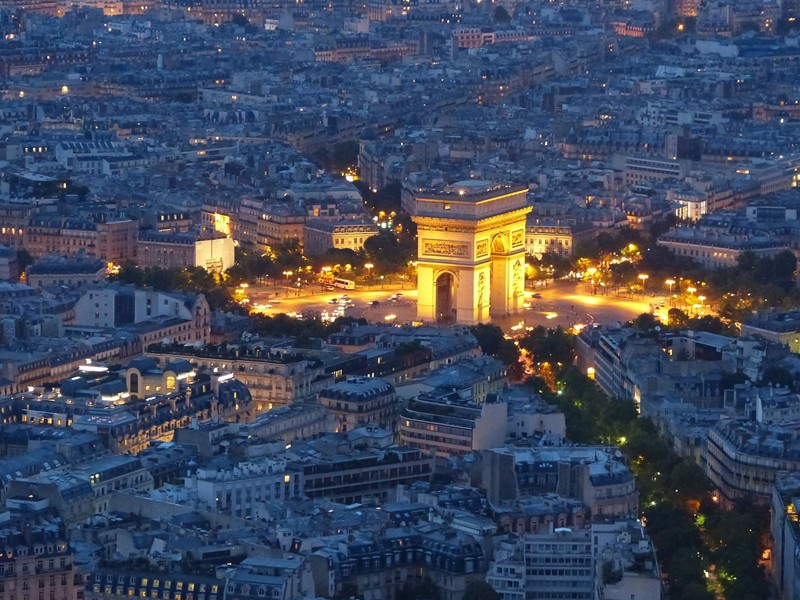
24334-013_france_part_1.ppt
- Количество слайдов: 43

